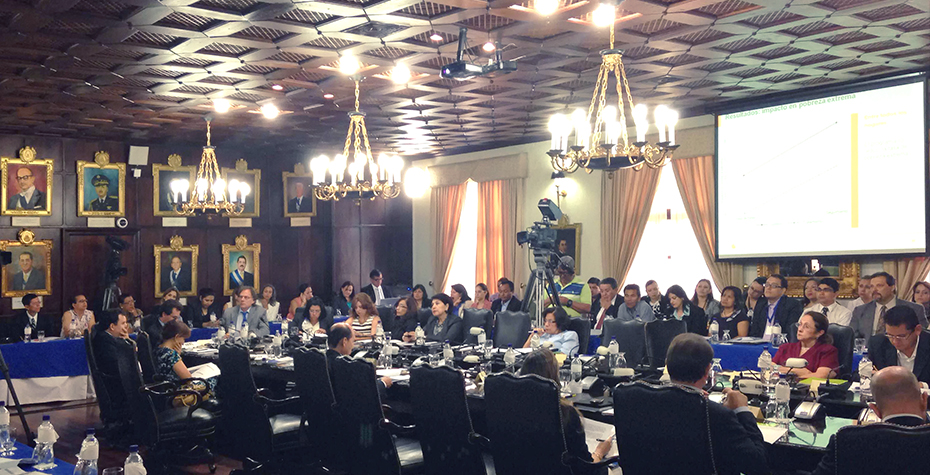With Support from a U.S. Government Fulbright Grant, McEwan Analyzed a Poverty-Alleviation Measure Called Bono 10,000

On October 9, Associate Professor of Economics Patrick McEwan presented his evaluations of the Honduran Bono 10,000 governmental program in a formal ceremony held at the Casa Presidencial in Tegucigalpa, Honduras, with President Porfirio Lobo in attendance.
Bono 10,000 is a Honduran government initiative that provides conditional cash-transfers to families in poverty and in extreme poverty. “Conditional cash transfers [or CCTs] are an increasingly popular policy to reduce poverty in poor countries,” explained McEwan. “They provide immediate cash transfers to poor households, but with the proviso that children attend school and receive regular health checkups. The idea is to reduce poverty in the short run, but foster conditions that will promote long-run poverty reduction. Latin American countries such as Mexico and Honduras were among the first to implement the policy.”
Bono 10,000 is the latest iteration of the decade-long Honduran CCT program. “It is the most ambitious version yet, both in its national scale and in the size of the transfer to poor families,” said McEwan. During the program, families with children old enough to attend school received an annual amount of 10,000 lempiras ($500) provided that their children remained enrolled. The study of the program took place in 300 poor villages across the country, of which 150 were randomly selected to participate in the program. The experiment analyzed the effects of the program by comparing the situations of those who were beneficiaries and those who were not.
McEwan specializes in the economics of education, with interests in applied econometrics and educational policy in Latin America and Africa. His research analyzing an earlier Honduran CCT program was published this year in the Journal of Public Economics. McEwan took on the project of analyzing Bono 10,000 through his role as a consultant for the National Opinion Research Center (NORC) at the University of Chicago. His work was supported by a U.S. government Fulbright grant, which enabled McEwan to spend Spring 2013 in Honduras, both researching and teaching a course on evaluation methods to faculty members of the National Pedagogical University in Tegucigalpa.
In his evaluation, McEwan analyzed the effects of the conditional cash-transfer program in 2012 and 2013, and found that the program reduced poverty by three percentage points. Primary school enrollment in affected areas also increased by 3 percent, and visits to health clinics saw an increase of 2.6 percent. “The program had an especially large effect on preventing school drop-outs among poor, rural children who are transitioning to middle school grades (from 6th to 7th),” said McEwan. “These children, especially boys, are at a very high risk of dropping out and usually are working on a farm.”
In the formal presentation of his findings at the Casa Presidencial, McEwan was joined by representatives from the World Bank and Inter-American Development Bank, and a professor from the Honduran National University as well as by the Honduran President Porfirio Lobo and Vice President María Antonieta de Bográn.
“Today we have once again confirmed that the conditional transfer program works to break the cycle of intergenerational poverty transmission and to invest in human capital,” said Giuseppe Zampaglione, the representative from the World Bank. “Bono 10,000 is a platform that enables coordination and a unique approach to making social protection in the country more effective.”
“Our evaluation confirms that Honduras, and many other countries, can reduce poverty,” said McEwan, “while simultaneously improving the health and education of young children in poor households.”
—Susan Puente-Matos ’14
